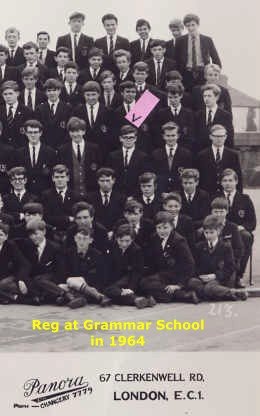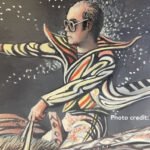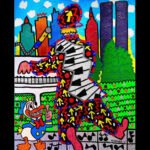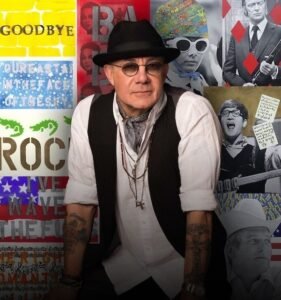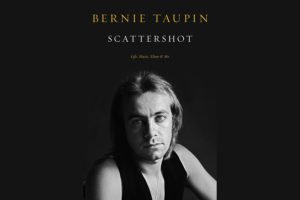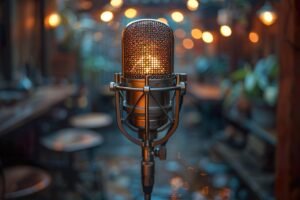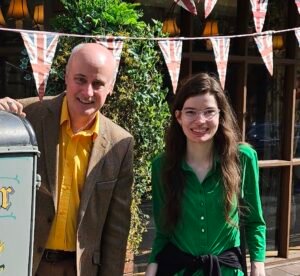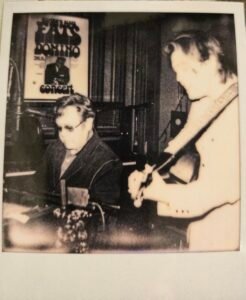 We mine our Elton archives each month to showcase news or features you won’t find anywhere else! Edited by Fran Gilles
We mine our Elton archives each month to showcase news or features you won’t find anywhere else! Edited by Fran Gilles
18/12/2000
By George Matlock
As part of our celebration of Elton’s birthday, his schoolmate Dick Morgan recounts to George Matlock “when we were young, and simply childish”.
Welshman Dick Morgan may have known the father of new talent David Gray (oft described as a modern-day Elton John with his pioneering White Ladder album and facial appearance), but he has a greater story to share. Dick was born in Pinner, Middlesex, in the vicinity of Elton, and now lives in his own father’s west Wales. He’s hoping to get a chance to meet Elton backstage, having seen the piano maestro at Margam Park, South Wales, last June.
George Matlock: What did you think of the show?
Dick Morgan: It was amazing. I’m not ashamed, but I had never seen Elton in concert until then. For a variety of circumstances. Never got it together. My sister has always been a great Elton fan. She’s been to at least one concert from each tour he’s done. Staging was superb. It was the first time on the UK Tour it hadn’t rained! I also went with my brother to the Highclere Castle show, and with my sister to Hylands House.
GM: So, take us back to the early years. How did you first meet Elton?
DM: On a (subway) tube train! We were both Junior Exhibitioner Scholars, as it was called in those days. For all kids in the Home Counties area around London the scholarships were offered to study music on Saturday mornings, in school term time. I actually got a place on the third attempt. Kids travelled in from all around London and converged on the Royal Academy of Music in Marylebone Road. We studied 9am to 2pm.
GM: What age would that be?
DM: It varied. I was 13, in 1960, and Elton is the same age as me, I was born the end of January 1947. We were both aged 13 to 16. You studied the instrument from your application, and then other subjects. So I had an hour on violin with my professor, a fiercesome woman called Amy Neame, then an hour on the fiddle with a student teacher, a compulsory piano hour, an hour of orchestra and an hour of theory. There was also a choir.
GM: What was your chosen instrument?
DM: Violin. And Elton was piano. As I recall, he was very highly-qualified before he got there. I went in at Grade 4 level, and then did Grade 5 and 6 while there, but didn’t cover myself in glory! Elton had Grade 8 piano before he got there. We weren’t in the same classroom. He would have been considered an outstanding student, but perhaps motivated in a direction other than the one they hoped for.
GM: Because it classical music, rather than rock-pop?
DM: Yes, it was a total classical musical place. I’m sure it’s less narrow-minded place now. I think he started there in 1960 as well. They got him into the choir, much to his disgust! He liked singing, so I think it was something about the choir! I’d been a church chorister. But with a string instrument, I was in the orchestra, not choir.
GM: Did he complain about the lessons?
DM: Only that the teachers were despairing of him, that he wanted to rock ‘n’ roll, and play jazz. They didn’t think he took it seriously. That struck a chord with me. My father was like that – his piano teacher refused to teach dad because once he got a piece of music in his ear, he would close the music book and play from memory. That was wrong.
GM: To confuse a title, he was a uniformed rebel! Did you wear uniforms at the Royal Academy?
DM: No. A sweater, casual. But he was formally dressed. Used to wear a jacket. I think I did too, and Cavalry-twilled trousers! And we both wore Suede shoes. It was the youth club culture. Then The Beatles turned it upside down. In 1961-63 it was still a phoney war! Metroland was like in Philip Norman’s book Elton, middle-class respectable, then things let go in the mid-1960s. After myy audition on the third attempt, the college principal, Terrence Lovett, invited students and parents to a hall and said: ‘Any of you who have ideas about being a professional musician, forget it. It’s a hard life, pays badly.’ A clever bit of psychology. He knew that some would become musicians, whatever. He was dispelling the myths. One of our contemporaries was percussionist Tristan Fry who later played with John Williams in famous band Sky. We were discouraged, and only if motivation is there you’d do what Reg did.
GM: You were a near neighbour?
DM: Yes, but I knew Reg from the commuting. I’d probably recognised him from the canteen. We tended to get on the same train going home. Then I discovered he lived two miles away and went to the school only half a mile away from me, Pinner County Grammar. I lived in West Avenue.
GM: Turns out you passed a chance to see Bluesology.
DM: I went on to University in Newcastle-upon-Tyne in 1965, and remember in my second year there Bluesology appearing at a club in the Haymarket, Newcastle. I was tempted to go to the show, but something else came up. Much to my regret. It’s funny how you look at things so differently now.
GM: Back to Royal Academy.
DM: Reg was the only real friend I had there. We had very little time between classes. The only time you made friends was on the trains. He would come to our house sometimes and entertain my parents with piano solos, much to their delight. We had a grand pianola, and he used to visit on his way home and play.
GM: What songs did he play?
DM: He used to play a Floyd Cramer song Last Date, and taught me to play it – badly, very badly! It fascinated me, this Country and Western song. He did it pretty slick. He also did a wonderful Semprini impersonation, playing his music and talking in a fake Italian Semprini voice. There used to be a radio programme called Semprini Serenade, particularly awful! Each song would be introduced by this guy with an Italian accent. Reg also used to play Side Saddle, turning to give this wonderful Russ Conway leer. Conway used to turn to the audience and give this gap-toothed grin (much like Elton), really awful! It’s sad that I just read about Russ’s death the other day. Reg used to bounce around as he played.
GM: Did you get the impression Reg was going to be a top star, or did you think that despite his abilities, he would end up doing something else?
DM: I remember being in some awe, and depressed! I wasn’t a musician of that calibre. He took great delight in entertaining my parents. In contrast, I hated entertaining, although I did play guitar many years later in clubs. I hated performing at Christmas, you can imagine, as did my brother and sister. I couldn’t understand why Reg loved it so much.
GM: Did you meet his parents?
DM: No. Although he used to talk about them endlessly. Well, about his mother at least. And this guy Fred [Fairbrother, stepfather] or “Derf” as he used to call him. He was a window cleaner as I recall. He spoke a lot about both of them.
GM: He’s always been close to his mother Sheila. Elton tried to bury a long-standing dispute with his father, just before he died in 1993. Did he ever talk about his real father?
DM: I was aware Fred was his stepfather. The only time I remember Reg talking about his father [Stanley Dwight] was when we went on a hilarious shopping expedition, to the tailors Hornes, in The Strand, London. His father had an account there. His father said he would buy Reg some clothes. Instead of going together, his father said Reg could go into the store and buy them on this father’s account. Reg asked me: ‘You wanna come?’ I said: ‘Absolutely!’. I phoned my parents to say I’d be delayed coming home. This was a Saturday lunchtime. We were about 14 years old. He went in store and identified himself, and it was ‘yes Mr Dwight, no Mr Dwight, three bags full Mr Dwight’. It was such an off-the-wall experience I will remember it forever! He had a card they hand you in the store. And he just bought stuff and put it on the counter. He bought a fairly outrageous pair of pyjamas. And then a pair of stretched trousers, something I’d never seen before. We were in hysterics. I had my violin case and music case, and he had his music case, and we were walking about this place like a pair of Middle Eastern Bedouins.
GM: And did he buy anything for you, or was it before he became generous, ha?
DM: No Cartier watch for me! We were going to go home when he suggested the shopping diversion.
GM: Was his shopoholicalism evident even then?
DM: It was the only time I saw him go shopping, but he was definitely revelling in it! Whether it was because he was getting money out of his father, who knows? It was again a contrast. My father didn’t have accounts at clothiers, and I would not have been sent to buy gentlemen’s clothes.
GM: And Reg was deciding what to buy, style and colour?
DM: Yes. These were amazing clothes. We weren’t flamboyant at that time. Soon after we both got into flared trousers! We had both been conservative dressers up to that point. But he was definitely starting to go for more unusual clothes. And he was a total chocoholic. He used to consume a mind-boggling amount of chocolate. We used to stop at the kiosk on Baker Street, London. I would say ‘you can’t possibly eat all that!’ But he would! A Mars bar, and something else, and something else, just gone like that!
GM: Chocolate is supposed to suppress depression. Was there any innate depression, given the unhappiness surrounding his real father?
DM: He was light-hearted, and good company. My father had strong opinions, like all people of that generation. But apart from being smacked when naughty, I came from a happy family. Had there been any problems in his family, I would have remembered it. But he did seem a bit different. He didn’t talk about his stint in the Northwood Hills pub – I found out after the event. He was very modest about his musical ability.
GM: Even now, he’s very modest about his achievements when you see him in TV chat interviews, such as the recent BBC Parkinson show.
DM: That was the best interview I have seen him give, and he came over like a nice, ordinary bloke, natural and even caught out Parky on a few occasions. Some of the earlier interviews, when he was taking drugs, he looked uneasy, and putting on a performance.
GM: No brothers or sisters. Was he shy?
DM: Very shy. All the more surprising that without much prompting from my parents, he would go into performer mode.
GM: Music was a form of escapism from unhappiness over his father, later becoming a way of life, and he was destined to play.
DM: When I lost contact with Reg, when he worked at music publishers [Mills], I’d heard he was in the mailroom, desperate to get into the music business. He was very interested in pop music, but I don’t remember him ever saying he wanted to be a pop star.
GM: When did you last see him?
DM: Just before university, to read Navel Architecture, summer of 1965. He went to the sixth form for one year, and then left school for Mills. Metroland in London is vast, and it’s easy to lose touch with people. I saw him at one or two parties. He had a friend who was a girl, as opposed to a girlfriend. Can’t remember her name, I’m sure he does! I went to a flat party, and saw the pair of them. They were real friends and hanged around together. After we both left the Royal Academy, I had in any case only seen him sporadically.
GM: In adolescence, did he ever talk about girls?
DM: No, not really. He was rather shy and had this awful hairstyle, big glasses and chubby build, eating chocolate all the time. He didn’t talk about either sex really. And his name was totally out of fashion even then. I knew no one else with that name. Kids can be cruel. But I wasn’t aware of him getting bullied for his name. And neither of us had nicknames.
GM: How about the name to become: Elton John?
DM: I had a friend from school. When I came back from university, he said: ‘have you heard that song Skyline Pigeon by Elton John?’ I said yes. He said: ‘have you heard Your Song?’ I said yes. He said: ‘do you know who Elton John is?’ I said no. He said it’s Reggie Dwight! I said: ‘bollocks! That can’t be right’. He challenged me to go and check the album sleeve, so I rushed to a record shop. I looked at the cover and was gobsmacked!
GM: Would you have called yourselves close friends?
DM: I think for the few years I knew Reg, we were. Every Saturday we were together. How close are friends at that age? Sadly, we didn’t take photos. The only time I got close again was around 1974. I was working for P&O Ferries in the City of London. One of the secretaries, Jean Tomlin, was a devoted fan, and a West Ham supporter, going to a benefit night at West Ham, and Elton was going to be there. I don’t follow football. I said to her: ‘I was a good friend of Elton as teenagers. If you don’t believe go up to him and say Dick Morgan sends his regards.’ She agreed to do that. She was a lovely girl, maybe I had an ulterior motive! Ha! And I wasn’t single by then! She came into the office next day, absolutely speechless! Apparently Elton asked how was I doing?
Special thanks to Dick Morgan. Interview conducted December 10, 2000.





